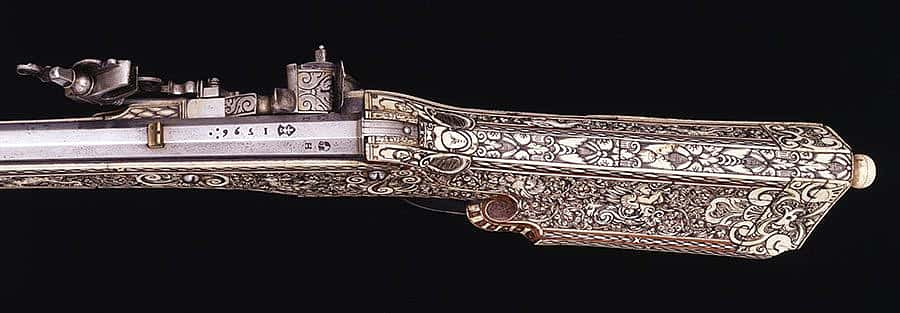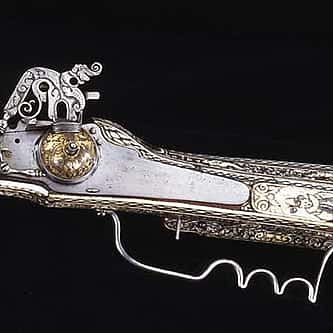
Treasures from Our West: Wheellock musket
Originally featured in Points West magazine in Summer 2013
The wheellock mechanism was the first self-igniting firearm action, but it is probably the least known of all gun action types. Its functional capability depends on two elements: a springactivated, serrated wheel that revolves when the trigger is pulled, and a piece of iron pyrite held in jaws that force it against the wheel. When the wheel spins against the pyrite, sparks are generated that ignite a small amount of gunpowder in the priming pan. The resultant “flash in the pan” is transferred through a small hole to the propulsion charge in the barrel, causing the gun to fire.
By the first decade of the sixteenth century (1500 – 1510), the wheellock pistol was in extensive use in the German provinces. In 1517, its use was banned in the Hapsburg Empire, and in 1522 it was banned in Italy. It was feared as an ideal assassin’s weapon.
Regardless of this stigma, the upper classes of the continent were quick to adapt the action to sporting arms, since it was no longer necessary to hunt with a smoldering match that betrayed a hunter’s presence, or to stop periodically to rekindle the match. These advantages, however, were outweighed by the wheellock’s complexity and expensive construction. It usually had to be made, and repaired, by clock makers and locksmiths. By 1550, a simpler and less costly ignition system, the flintlock, had been introduced, and it would dominate firearms types for the next one hundred years.
Still, the often beautiful and more reliable wheellock would continue to be used by its wealthy and prominent owners well into the middle of the eighteenth century.
Wheelock musket. Gift of Olin Corporation, Winchester Arms Collection. 1988.8.1028
Post 150
Written By
Nancy McClure
Nancy now does Grants & Foundations Relations for the Center of the West's Development Department, but was formerly the Content Producer for the Center's Public Relations Department, where her work included writing and updating website content, publicizing events, copy editing, working with images, and producing the e-newsletter Western Wire. Her current job is seeking and applying for funding from government grants and private foundations. In her spare time, Nancy enjoys photography, reading, flower gardening, and playing the flute.


